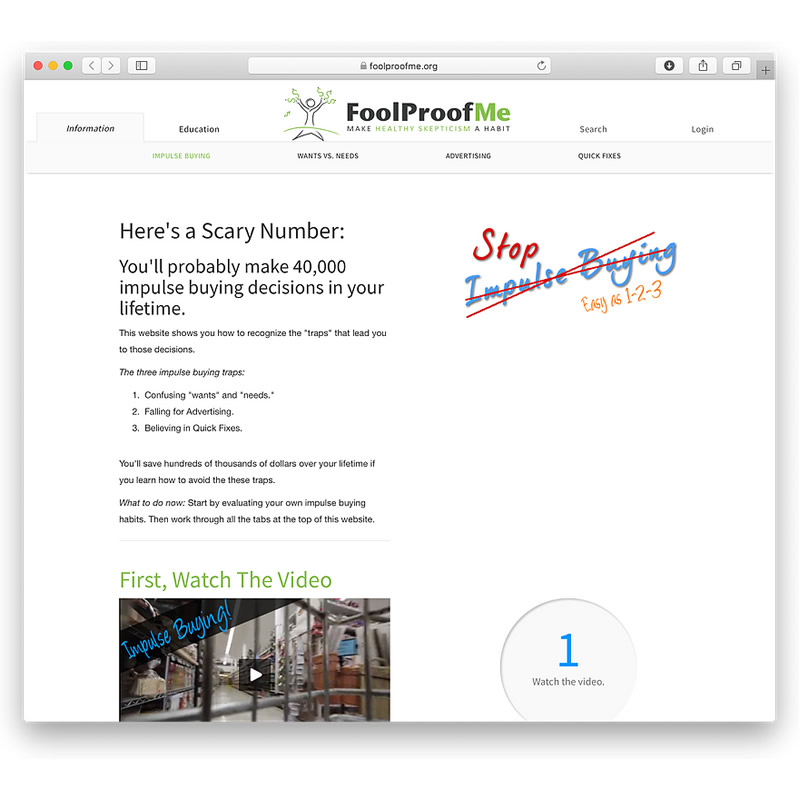Impulse Buying
Here are some scary numbers:
You'll probably make 40,000 impulse buying decisions
in your lifetime.
That'll cost the average consumer about $200k.
Don't Believe Us?
Check this out!
Everybody Impulse Buys!
But if you know what's happening around you, you can stop burning money (you don't have).
Ever Seen This?
A kid in a grocery store randomly grabs an item from a low shelf for a parent to buy. The parent, without thinking, adds it to the cart.
Ever Done This?
You've bought something in the past that you never use, or really didn't need.
Ever Felt This?
Regret over something you've bought.
Or Felt This?
Stress when a bill arrives.
Everywhere Around Us...
From the day you were born, you have been surrounded by a marketing environment that is based on persuading you to spend money without planning—the definition of impulse buying.
If you think about it, isn't the goal of virtually all marketing to get you to make an impulse buy? Have you ever seen an ad that said, "Don't buy this now! Wait awhile and think about it—and make sure you try to find something cheaper and better at our competitors!"?
In the Air
Impulse buying messages—like the air we breathe—are omnipresent and accepted by us without thinking.
If You Are an "Average" Consumer:
At least 40% of all the money you spend in your entire lifetime will be on "impulse buys".
You'll make about 40,000 impulse-buying decisions in your life.
You—alone—will probably waste $200,000 or more because of impulse buys.
You'll buy something you don't need, pay more than you need or buy something that can actually hurt you.
But learning to break the impulse-buying habit actually takes work! Marketers know it takes work, too. They know that if you're faced with enough impulse decisions, you'll eventually become fatigued.
Bingo! You make a lot more impulse buys.
How Do We Stop Bad Impulse Buys?
You can retrain your brain. And in retraining your brain, you will influence the shopping habits of all people who regularly shop with you.
Start with a Reality Check
Take an "Impulse-Buying Inventory" of Your Home
Did you find anything you bought but haven't used or don't really need?
Think About Your Last Visit to a Store
Any store. Ask yourself this question about each item you bought: "Did I go into the store planning to buy that item?"
Keep Your Mind on a Bigger Goal Than the Impulse Buy
Life isn't fun if you're always telling yourself, "Don't buy that!" But if you look at impulse buying moments as chances to help you reach a bigger goal in your life, you're taking positive action.
For Example, Thinking:
"Hey. If I don't spend that twenty, my savings account can grow." Or "If I skip that purchase, the vacation gets closer."
And Then You Should Probably Adopt These 3 Core Habits:
1. Develop Shopping Lists for More Than Groceries
For clothes, housing items, vacation goals and major purchases like cars, homes and education.
2. Expect Marketing Tricks
Have you ever bought a "jumbo" size of an item because you assumed it was cheaper in volume? Did you know that many times it isn't cheaper?
3. Budget Money for Impulse Buys
Skipping all impulse buys is boring and self-defeating. Set a small "play" budget for yourself.

Every Impulse Buy Has Long-Term Consequences
Modifying even half of those buys can change your life financially.
You Need to Do This, Right?
That All Said
Check this out!
Test Your Spending
Know how much you're throwing away!
Take a few minutes and do the FoolProof "Gullibility Test".
It's not mandatory, but it may give you a solid overview of your own (impulse) spending habits. Wouldn't you wanna know how much of your hard-earned money you're wasting?
Test me!



